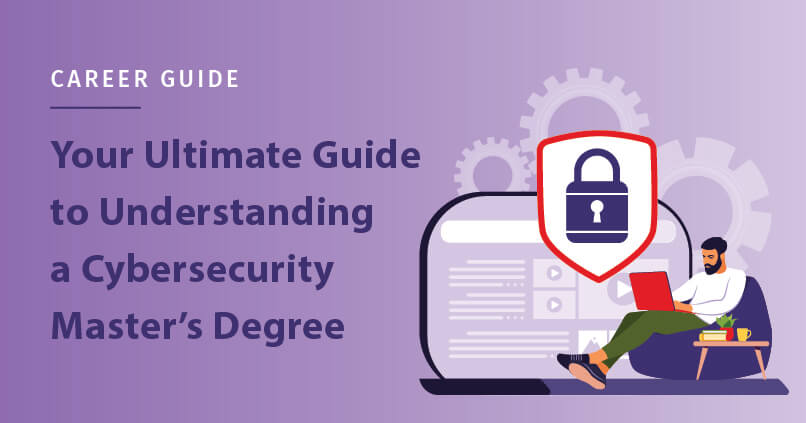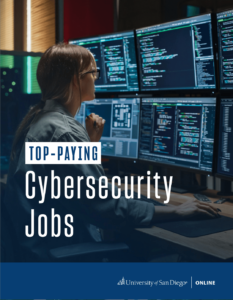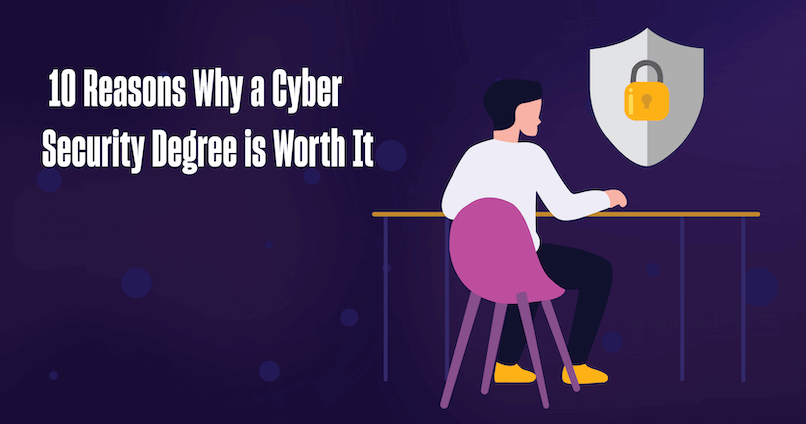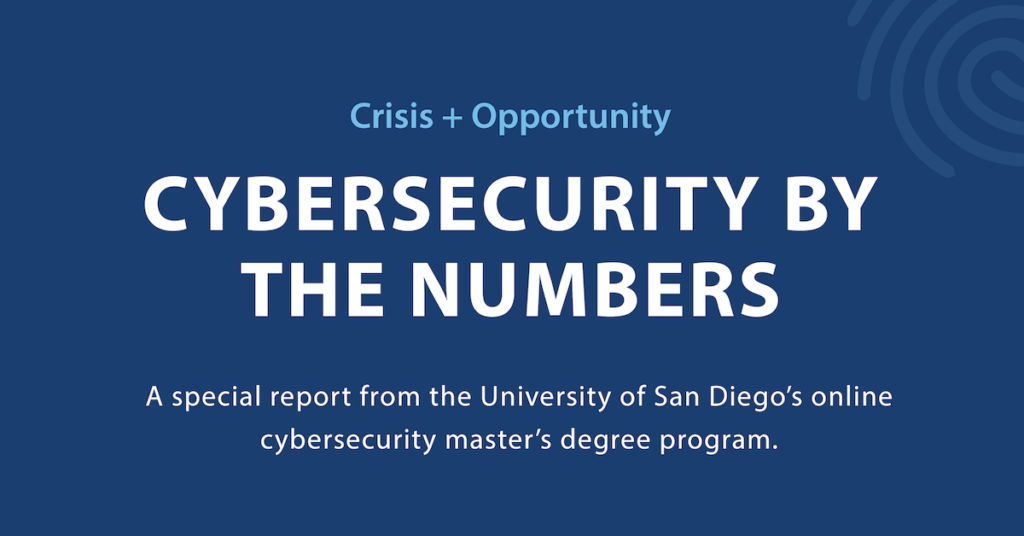Cyber criminals are becoming increasingly deft and creative with email phishing, data breaches, government hacks and costly ransomware. These cyber attacks have spurred the demand for skilled cybersecurity professionals. An advanced degree can be extremely beneficial for a cybersecurity career since it can provide valuable experience and education — and give you an edge over the competition. Cybersecurity professionals are needed in practically every industry, and typically those with an advanced education secure higher level — and paying— jobs. But what does a cybersecurity degree program entail and how can you choose the best one for you? Read on to find the answers to these questions — and more!
What is a Cybersecurity Master’s Degree?
A cybersecurity master’s degree is an advanced degree that prepares students for a career in cybersecurity or related industry. It’s also a great way for industry professionals to take their current cybersecurity career to the next level.
Why Should I Get a Master’s Degree in Cybersecurity?
There are many reasons why you should get a master’s in cybersecurity. Even though cybersecurity is a relatively new field, it’s one of the fastest growing. Jobs in computer and information technology occupations are predicted to grow 11 percent from 2019 to 2029, according to the US Bureau of Labor Statistics. A master’s can secure you the tools you need to be successful post-graduation and obtain the highest level jobs in your field. It will prepare you with the modern skills and tools you can use to fight cybercrime today and in the future.
Many employers are looking to hire skilled cybersecurity professionals who have applied experience. In a master’s degree program, you learn a mix of policy and operations, with a hands-on, applied approach. You can learn from practitioners currently working in the field and make connections. Plus, a master’s in cybersecurity will set you apart from other candidates when you are applying for jobs.
What Jobs Can I Get With a Master’s Degree in Cybersecurity?
Due to the prevalence of technology in businesses, there are needs for cybersecurity professionals across all types of industries. For most of these jobs, undergraduate degrees are required and graduate degrees and certifications are recommended.
A security consultant assesses the risks and security of a business and makes recommendations for implementing safety procedures and protecting the business’s information. Security consultants will need to stay on top of current cybersecurity trends, such as more sophisticated phishing attempts, IoT attacks, cryptojacking and more. Skills necessary for a successful security consultant include computer programing and coding, knowledge of encryption technologies and asset protection.
The responsibilities of a network administrator will vary, depending on the size and needs of the company. Main responsibilities include configuring and testing network equipment, monitoring the network and troubleshooting. Network administrators must have a knowledge of complex networks, be able to monitor and manage server infrastructures and have experience with network troubleshooting.
Similar to a network administrator, a systems administrator can be responsible for updating and installing software, resolving computer and server issues and researching the IT world to keep their company protected. In smaller companies, network and systems administrator responsibilities may overlap.
Ethical hacking is exactly what it sounds like. Ethical hackers are hired to try to break into a computer system and think like a cybercriminal to expose vulnerabilities in a network. Responsibilities of this position include preventing attackers from stealing data, helping to put security defenses in place and vulnerability assessments.
A cybersecurity analyst is the first line of defense in the event of a cybercrime. Main responsibilities of a cybersecurity analyst include preventing and defending networks if a cyber attack occurs, implementing a discovery recovery plan and keeping updated on current trends in cyber attacks.
Similar to how a financial auditor will review a company’s financials, a cybersecurity auditor will conduct a review of a company’s cybersecurity practices. Responsibilities include testing the effectiveness of networks and information systems, reviewing internal security protocols and investigating recent breaches or security concerns. A cybersecurity audit includes a detailed report and comprehensive analysis of existing cybersecurity systems and recommendations on how to improve the systems.
Cybersecurity specialists, also called IT security specialists or network security specialists, work to protect digital system assets from threats. Job responsibilities include putting security measures in place during network development and updates, protecting private information from unauthorized users and building firewalls into security systems.
A cybersecurity architect is a senior-level position that is responsible for testing and designing a company’s network security infrastructure. Cybersecurity architects must think like hackers and have a strategy to defend attacks against information security. Job responsibilities include identifying current security threats, developing a complete understanding of a company’s IT system and maintaining and improving company security policies.
Penetration testers, or pen test specialists, take on the persona of a hacker to detect and pinpoint vulnerabilities in computer systems. The job requires up-to-date technical skills and a high level of technical expertise. Skills needed for this position include advanced coding knowledge, a clear understanding of how security breaches disrupt businesses and comprehensive knowledge of computer security, including forensics and systems analytics.
| Career/Position | Average Salary Level |
| Security Consultant | $91,000 |
| Network Administrator | $83,510 |
| System Administrator | $83,510 |
| Ethical Hacking | $81,179-$116,323 |
| Cybersecurity Analyst | $99,730 |
| Cybersecurity Auditor | $95,778-$105,635 |
| Cybersecurity Specialist | $92,000-$133,330 |
| Cybersecurity Architect | $129,000 |
| Penetration Tester | $102,000 |
Recent Cybersecurity Master’s Degree Graduates
USD is proud to have alumni working at the top of their field at a wide range of companies. Some alumni have little or no experience in the field, but are interested in technology and cyber crime. The Master’s of Science in Cyber Security Engineering and Master of Science in Cyber Security Operations and Leadership offer hands-on experience and innovative curriculums to prepare students for a career in cybersecurity.
Here are a few success stories that highlight how a master’s degree in cybersecurity has shaped these alumni’s career paths.
Adrian Villegas proves that you don’t need a technical background to transition into a cybersecurity career. After working at Target in security and operations for 12 years, he knew it was time for a change. The University of San Diego was a great fit for him and he was encouraged to apply, even with the lack of technical background. After taking a few Python programming and information security classes, he was admitted to the program. Upon graduating, he used his USD connections to secure a position as an information security analyst at NextGen Healthcare.
Kylee Lockwood has a diverse resume, including production assistant on “American Idol”, hearing health practitioner and audio engineer. Although she had no background in cybersecurity, she was familiar with web development and audio engineering. The UDS Operations and Leadership program was a great fit and Kylee learned a lot. She now works as an Information Assurance Analyst at General Atomics, where she was ahead of the competition by having a master’s in cybersecurity.
Mansi Thankar is proud to be a woman in a male dominated field. Being a minority drives her to help bridge the gender gap and encourage women to get more involved in cybersecurity. She’s been able to network with cybersecurity professionals and learn about opportunities from peers and program staff. After graduation, she is looking forward to being “a superhero in people’s digital lives”.
After experiencing a cybersecurity hack on her own website, Lynn Hoffman was inspired to pursue a master’s degree in cybersecurity. She had a great experience obtaining her undergraduate degree at USD and decided to pursue her graduate degree there, too. Since graduating, she’s started her own business that helps companies incorporate cybersecurity practices and preventative measures in place.
By the end of his finals for his master’s degree, Paul Cho had secured a position with Salesforce as a security engineer. Technology had always been of interest to Paul, but he had never seriously thought about cybersecurity until he was working at Stanford and experienced massive data breaches. This inspired him to learn more about cybersecurity and how he could make a difference with his career. Making a difference is what he does now, and he uses the skills he learned in graduate school every day.
Three Questions You Should Ask Before Getting a Cybersecurity Master’s Degree
1. Do your career goals align with what is being taught in the program?
There are many paths to choose from within the cybersecurity field. You want to be sure to choose a degree and program that aligns with your career goals.
2. What is the program format and does it work with your lifestyle?
In order to accommodate working professionals, some universities offer online or hybrid cybersecurity graduate degree programs. These alternative formats are great options for those looking to balance education with a career or family responsibilities. If you do choose an online or hybrid degree format, make sure the program offers the hands-on, applied learning component that is critical in the cybersecurity field.
3. Who developed the program, and who will be teaching the classes?
In the dynamic and ever-changing field of cybersecurity, learning from industry professionals can make all the difference. It can also be helpful to learn how the program was developed and who was responsible for its development. For example, at the University of San Diego, the Master of Science in Cyber Security Operations and Leadership degree was developed in conjunction with government and industry leaders who contributed to the curriculum and the important content to make the program a success.
Continuing Education Options in Cybersecurity
PhD Programs
PhDs aren’t required for many cybersecurity jobs, but with the expanding and ever-changing climate of cyber crimes, research is becoming more important. Those with PhDs in cybersecurity generally teach, hold high-level management security positions in a business or consult with companies.
A certification is a more significant achievement than a certificate. Certifications are for seasoned professionals looking to advance their skills and increase their knowledge, while certificates are designed for entry-level professionals looking to learn a bit more in their field. Certifications, while not always required for a position, help boost resumes and increase salary potential. There are many cybersecurity certifications that help cybersecurity professionals learn new skills and stay updated on the trends in the industry.
[RELATED] Which Cyber Security Program is Right For You? Download our free infographic to help decide >>
Common Admission Requirements
While degree admissions vary, here are come common requirements of advanced cybersecurity degree programs:
- Bachelor’s degree from a regionally accredited institution
- Bachelor’s GPA of 2.75 or higher (may differ depending on the institution)
- Completion of a standardized test (GRE, GMAT, etc.)
- TOEFL scores (if applicable)
- Statement of purpose
- Letter of support or letters of reference
- Resume demonstrating IT experience and highlighting any cybersecurity experience
What is the Process for Applying for a Master’s Degree in Cybersecurity?
It can be difficult to know where to start when applying for a master’s degree in cybersecurity. The first step is to speak to an enrollment advisor and update your resume. After learning more about the program and admission requirements, secure your letters of support or recommendations. Prepare a statement of purpose, start your online application process and take a deep breath!
Comparing Cybersecurity Master’s Degree Options
There are many paths to take when entering into the cybersecurity field. Here are some popular master’s degree choices:
Cybersecurity – A Master’s in Cybersecurity prepares professionals for an upper level job in cybersecurity or a related field.
Computer Science – A Master’s in Computer Science focuses on hands-on learning for current computer scientists and engineers.
Computer Engineering – A Master’s in Computer Engineering can prepare graduates for a management position or high-level job working with hardware or software engineering, data analytics, electronics and more.
Information Technology – A Master’s in Information Technology is for those interested in starting or advancing a career working with data science, engineering or other specialized technological areas.
Information Assurance – A Master’s in Information Assurance prepares those interested with the skills to protect online data. Common job titles include information security analyst, computer network architect and computer and information systems manager.
Network Security – A Master’s in Network Security can help network security specialists into better employment with higher salary.
Information Systems Security – A Master’s in Information Systems Security will arm professions with the skills to implement firewalls, security software and other preventative security tools across a network.
MBA in Information Security – An MBA in Information Security prepares professionals with an advanced knowledge in cybersecurity prevention and management.
Asynchronous vs. Synchronous Online Cybersecurity Programs
Synchronous programs allow for real-time instruction and interaction between the instructor and students.
Asynchronous learning doesn’t necessarily happen at the same time; it provides more flexibility for students because they can work at their own pace and during the time that best works for their schedule.
Common Cybersecurity Master’s Courses
- Cybersecurity Operations and Leadership
- Foundations of Cybersecurity
- Cryptography
- Risk Management
- Cybersecurity Management
- Cyber Intelligence
- Penetration Testing
- Software Design and Development
Different Kinds of Cybersecurity Program Accreditation
It’s important that a program is accredited, which means that the program is eligible for financial aid and credits can transfer. The University of San Diego has earned both regional and national accreditations, including:
- The WASC Senior College and University Commission – WASC is a regional accrediting agency that is recognized by the U.S. Department of Education as certifying institutional eligibility for federal funding in a number of programs, including student access to federal financial aid.
- The National Council for Accreditation of Teacher Education – NCATE is recognized by the U.S. Department of Education and the Council for Higher Education Accreditation to accredit programs for the preparation of teachers and other professional school personnel.
How to Select the Best Master’s in Cybersecurity Program
On-Campus vs. Online Program
On-campus programs offer in-person learning and a collaborative environment. However, online degree programs are just as academically rigorous and offer the opportunity to interact with and learn from fellow cybersecurity professionals from around the world. It’s important to choose a program format that fits with your lifestyle and learning preferences.
School/Program Reputation
For master’s degree programs, the department and program reputation matters more than the school’s reputation. Employer’s are less interested in name recognition and are most interested in a strong and relevant cybersecurity department. It is important to note that the field of cybersecurity is quickly evolving so some of the most innovative programs can be relatively new — but just because a program is new, doesn’t mean it isn’t good.
Program Curriculum and Objectives
When choosing a cybersecurity program, it’s critical to explore curriculum, course descriptions and skills taught. Since the world of cybersecurity is constantly changing, it’s also important to seek out a master’s program that gives you the necessary tools to be a lifelong learner in the field. Cyber experts must be prepared to constantly update their skills.
Faculty Reputation
Especially true in cybersecurity, you’ll want a program with skilled instructors who have extensive experience in the field. Check out faculty bios and look for indicators that faculty is diligent about staying aware of changes and advancements in this fast-changing landscape.
Total Cost
There’s no argument that a degree in cybersecurity is also a significant investment. Cybersecurity master degrees typically range anywhere from $20,000-$40,000. But just because a program is expensive doesn’t necessarily mean you shouldn’t pursue it.
Opportunities for Financial Aid
Financial aid is a great resource to help reduce the amassing financial strain that graduate programs can cause. Many programs have scholarships and grants offered, so make sure to do your research.
Flexibility and Work/Life Balance
Online degree programs are a great choice for those looking for a flexible schedule to accommodate work/life responsibilities. Some programs are 100% online, while others are hybrid. There are also programs that require you to be on campus for an extended period of time, like two weeks, at some point during the program. You should also consider if there are deadlines on program completion and how many classes are required during each semester.
Length of Program
Be sure to understand how long it will take you to complete your degree at your pace. Ask yourself things like, if you are only taking one class per semester, how many years will it take to complete your degree? Or, how quickly will you be able to complete your degree program?
Start Dates
Some schools start cohorts once or twice a year, and some have rolling admissions. With rolling admissions, schools admit students throughout each semester, so you can start your degree sooner.
Admission Requirements
Different programs will have different admission requirements. Be sure that you meet them all before applying. If you don’t meet all of the requirements, reach out to the school and ask for advice. Sometimes certain requirements can be waived or can be completed after applying but before enrolling in the program.
Cybersecurity Scholarships
A cybersecurity degree is an investment and luckily, there are many scholarships available for those interested, including:
- Scholarships for Women Studying Information Security
This scholarship is offered to women entering the cybersecurity field to encourage more women to work in the industry.
- Center for Cybersecurity and Education Graduate Level Scholarships
The Center for Cybersecurity and Education offers two scholarships, the women’s scholarship and the graduate scholarship.
- Women Techmakers Scholars Program (Formerly The Google Anita Borg Memorial Scholarship)
This scholarship is for those who identify as female. Scholarship recipients get the opportunity to take part in the annual Google Scholars Retreat in Mountain View, CA. They can participate in workshops and take advantage of professional development and community outreach opportunities.
- AFCEA Scholarships
The AFCEA offers several graduate-level cybersecurity scholarships to those in active duty or veterans of the military. These include the Ralph W. Shrader Graduate Diversity Scholarship and the War Veterans Scholarship.
- The Yellow Ribbon Program
Yellow ribbon schools such as the University of San Diego offer support to veterans through yearly scholarship money that is then matched by the VA scholarship program.
Top Companies Hiring Cybersecurity Master’s Degree Graduates
Here are some top companies hiring on LinkedIn:
- Amazon
- Apple
- FBI
- JP Morgan Chase & Co.
- Fidelity Investments
- Lockheed Martin
- Deloitte
According to Glassdoor, here’s a list of top companies hiring for cybersecurity positions:
- U.S. Air Force
- Booz Allen Hamilton
- ManTech
- Lockheed Martin
- ASM Research
- SAIC
- IBM
- U.S. Department of Defense
- Fannie Mae
- Boeing
- NASA
Professional Cybersecurity Organizations and Resources
It can be hard to know where to start when researching information about cybersecurity. Here are some helpful organizations and resources that can help you stay updated in the industry.
- The International Information Systems Security Certification Consortium
- Information Systems Audit and Control Association
- Association of IT Professionals
- Information Technology Infrastructure Library
- The SANS Institute
- Information Systems Security Association
- Center for Internet Security





